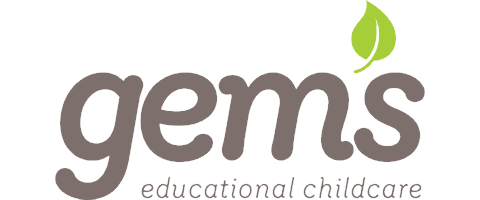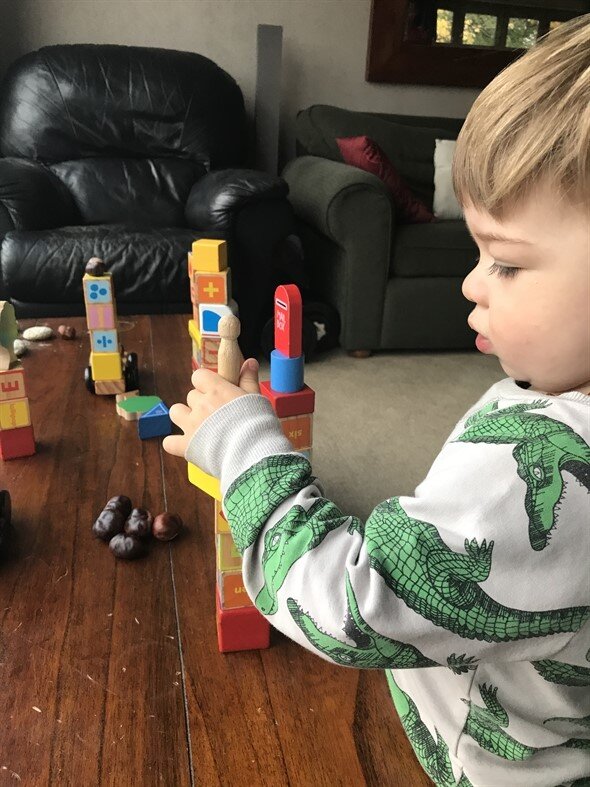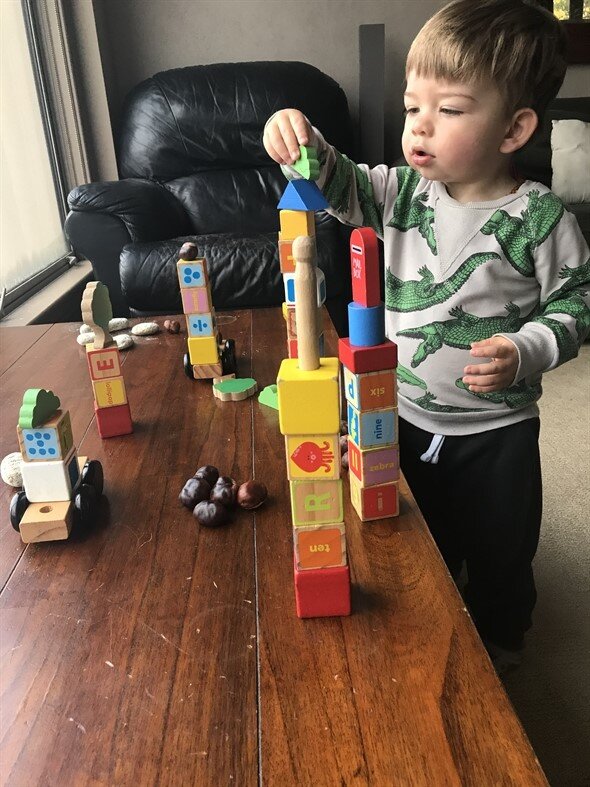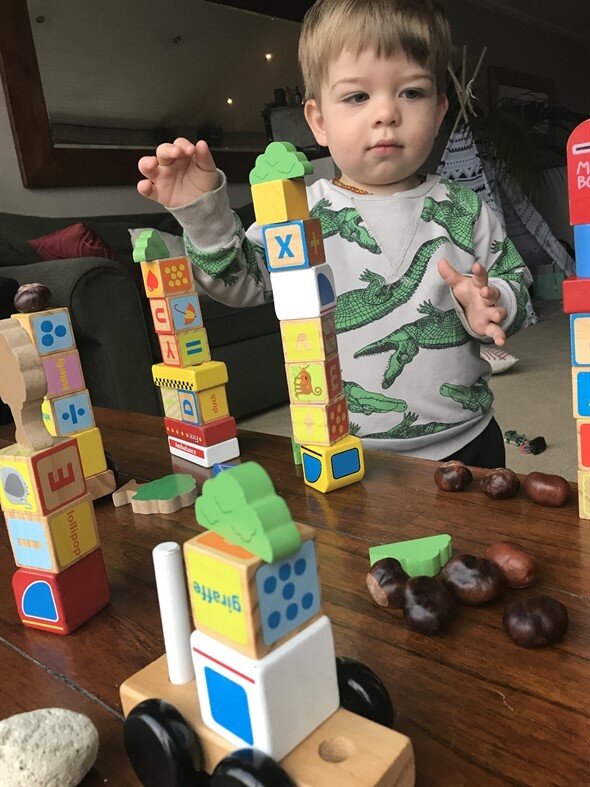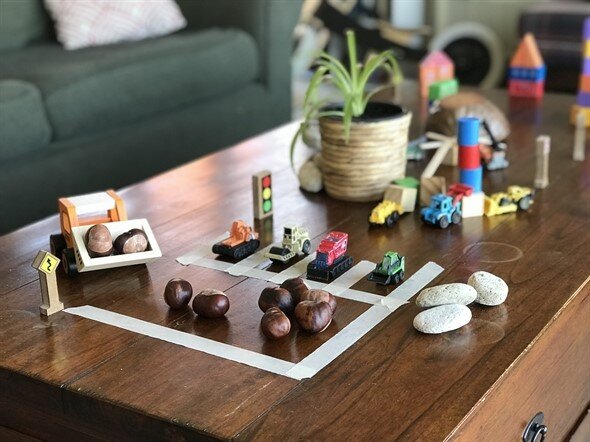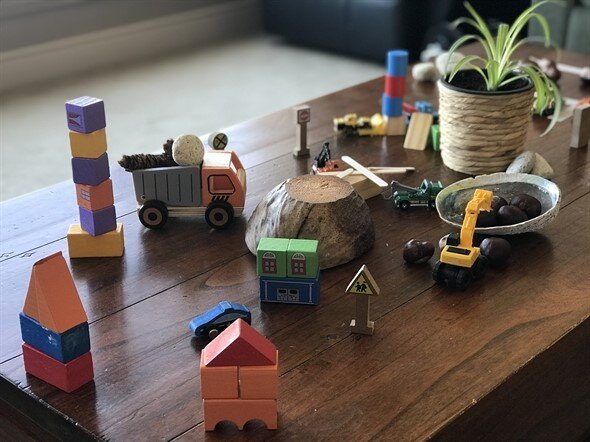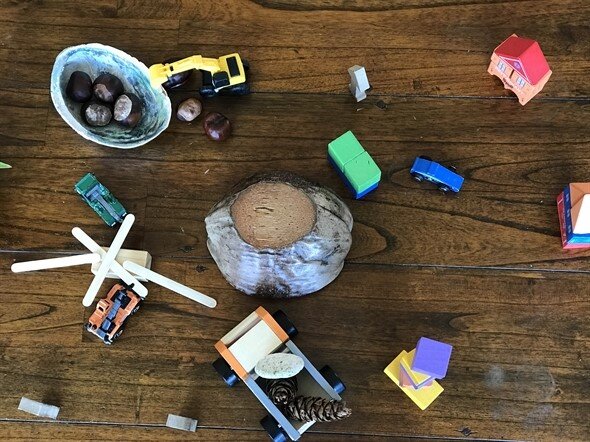Block Play/ Poro Rakau with Alissa & Finn
Kia Ora friends,
Finn and I wanted to share one of his favourite play activities he's interested in at the moment. He’s loving block play/poro rākau, and it´s open-ended play opportunities. Blocks are valuable manipulative and creative resources for children and adults.
They can help to develop maths, science, art, language and social skills. They also provide plenty of opportunities for developing persistence, problem solving and creating 3-dimensional structures.
Finn needs a lot of space when he's playing with blocks. I usually put the set ups on our low coffee table in the living room, or the carpet. The carpet is more comfortable, but it looks like it's definitely easier for him to build on an uncarpeted area. Using the low coffee table allows him to move around easier without knocking his set ups over, and blocks, cars and animals are easier to reach.
Block play offers an open-ended, creative and valuable play and learning experience available to every setting. It offers him freedom – to explore, take apart and put back together any block-based creation he can think of. There are many benefits to be gained from this activity.
Block play can help you to learn about:
1. Imagination: You are free to follow your own plan/ideas, or can share a friend’s vision and work together to create something new.
2. Self-expression: You are able to explore and express yourself through your play, creations and discoveries, a form of communication that’s particularly valuable for bilingual or non-verbal children.
3. Problem-solving: Blocks offer a great platform to develop problem-solving and reasoning skills. This can be deliberate, with you consciously working to develop a solution, or as a natural consequence of play, as you learn first-hand what does and what doesn’t work. Sometimes it is intentional: “I want to build X. How do I do that?” Other times it is in-the-moment: “To go higher and add to one side, what can I use?”
4. Mathematics: Due to the many shapes, sizes and colours on offer, blocks offer ample opportunity for you to practise important maths skills, covering measurement, number, symmetry, balance and estimation. By comparing shapes and sizes, creating patterns or providing measuring and weighing tools, you can extend play and exploration.
5. Physical development: Block play promotes the development of spatial awareness and develops hand-eye coordination as you reach for, lift, move and build with blocks, strengthening your fingers, hands and arms.
6. Creativity: Blocks are loose parts, meaning you are free to combine and re-combine them in countless ways. Your parents can add alternative resources such as small world characters, cars, animals or paint and pencils to further extend opportunities for creativity.
7. Science: Through the exploration of cause and effect and experimentation, you are able to develop your problem-solving skills, test hypotheses and practise scientific reasoning. Blocks help you to become familiar with balance, weight, spatial awareness and gravity.
8. Self-esteem: You can take risks in your block play, helping you to discover that you have ideas and that you can bring your ideas to life by creating, developing, transforming, demolishing, and re-creating something new and unique.
9. Personal, social and emotional development: Block play allows you to co-construct and negotiate. You learn to take turns, share materials and cooperate with others, forging new friendships. It also encourages self-reliance, increases attention span and develops your sense of self.
10. Communication & literacy: As you encounter new experiences through block play, there are countless opportunities for discussion and the development of new vocabulary. Social interaction with your parents and peers unlocks further benefits while using blocks can support story creation and collaborative storytelling.
Parents can support you by:
Allowing you to explore at your own pace
Supporting you to put your own ideas into practice
Helping you sort out problems
Listening and talking to you about what you are doing
Encouraging you to help tidy up afterwards
Making sure you are safe
Ideas for equipment:
Home-made blocks made out of different sized boxes, multiple unit blocks in full, half or quarter sets, sets of coloured blocks and items to use alongside blocks such as toy cars, people and animals plus other items such as plants, stones, driftwood, pinecones, cardboard and fabric are great.
Have fun! I'm looking forward to seeing your block play creations and setups.
Alissa and Finn xx
